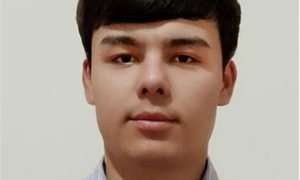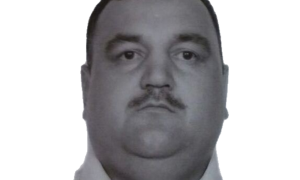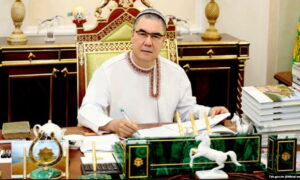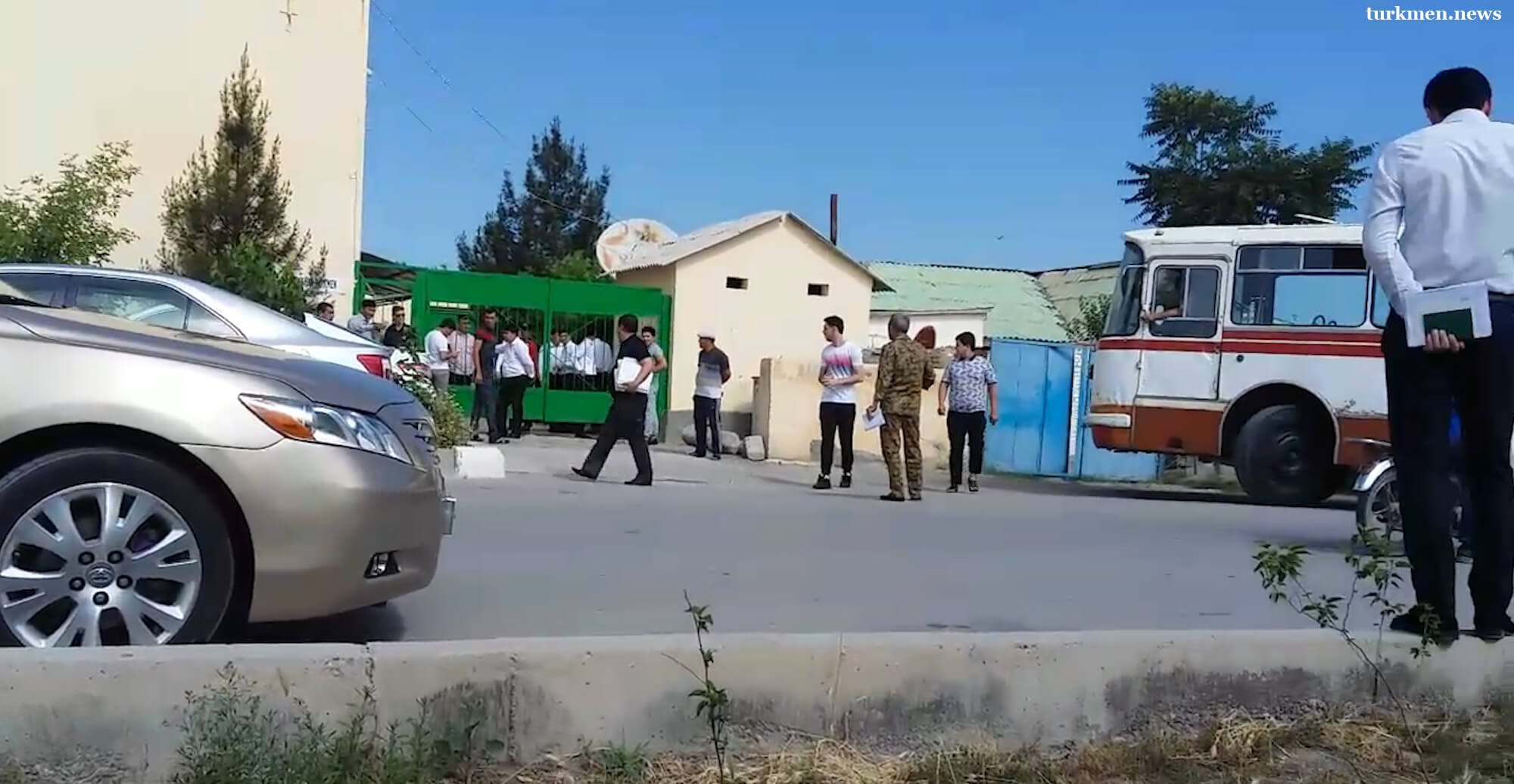The jailing on 6 August for two years each of two brothers from Dashoguz – Sanjarbek and Eldor Saburov – brings to four the known number of Jehovah’s Witnesses jailed as conscientious objectors in 2020. Six others jailed in 2018 and 2019 are still serving jail terms. Both brothers expressed willingness to do a civilian alternative service, but Turkmenistan – despite repeated United Nations recommendations – has failed to introduce one.
 

On 6 August, a court in Dashoguz Region of northern Turkmenistan jailed Jehovah’s Witness conscientious objector Sanjarbek Saburov – who is due to turn 26 on 12 August – and his 21-year-old brother Eldor Saburov. Each was handed the maximum punishment of a two-year jail term for refusing compulsory military service on grounds of conscience. For both brothers, this is their second criminal conviction on the same charges.
Both Saburov brothers were summoned to a Military Conscription Office in April to report for military service. Both had told the Conscription Office (Sanjarbek in October 2019 and Eldor in spring 2020) that they were ready to perform an alternative civilian service. Turkmenistan does not offer an alternative to compulsory military service (see below).
The convictions of the Saburov brothers bring to four the number of conscientious objectors to military service known to have been jailed so far in 2020. They also bring to 23 the number of known criminal convictions for conscientious objection since January 2018.
The Saburov brothers are appealing against their convictions to Dashoguz Regional Court, though courts and prisons often obstruct such appeals (see below).
Jehovah’s Witnesses are conscientious objectors to military service and do not undertake any kind of activity supporting any country’s military. But they are willing to undertake an alternative, totally civilian form of service, as is the right of all conscientious objectors to military service under international human rights law.
The sentences handed down to the Saburov brothers bring to 10 the number of conscientious objectors to compulsory military service known – as of 10 August 2020 – to be serving sentences. All of them are Jehovah’s Witnesses (see full list below).
Including Eziz Dovletmuradovich Atabayev (born 15 March 1998), who has been serving a jail term since 2018, 10 Jehovah’s Witness conscientious objectors are serving jail terms of between one and four years. Eight of them are imprisoned in Seydi Labour Camp in the eastern Lebap Region, and the two Saburov brothers are expected to be transferred to the same labour camp (see full list below).
Turkmenistan has ignored repeated international calls, for example by the United Nations Human Rights Committee, to introduce a genuine civilian alternative to compulsory military service, to stop prosecuting and punishing conscientious objectors, and to compensate those it has punished.
Asked about the Saburov brothers’ prosecution and whether it had been involved, the man who answered the phone of the deputy head of Dashoguz Region’s Military Prosecutor’s Office told Forum 18: “There were no such cases here” (see below).
The official who answered the phone at the office of the regime-appointed Human Rights Ombudsperson Yazdursun Gurbannazarova told Forum 18 on 10 August that she was out at a meeting in the Foreign Ministry. He said no one else could answer Forum 18’s questions.
Asked why the regime is not willing to introduce a civilian alternative service in line with repeated United Nations (UN) recommendations, and why young men continue to be imprisoned, Ata (last name unknown) of the Foreign Ministry’s International Organisations Department told Forum 18 that Turkmenistan “is dealing with these bodies, including the UN”. He said he did not agree that Turkmenistan was failing to implement UN human rights recommendations (see below).
The UN Human Rights Committee has published 13 Decisions in favour of 15 conscientious objectors from Turkmenistan, all of them Jehovah’s Witnesses (see below).
Another Jehovah’s Witness conscientious objector former prisoner, Arslan Begenchov, lodged a case to the UN Human Rights Committee in 2018 and is awaiting a decision (see below).
Jehovah’s Witnesses filed a complaint with the UN Working Group on Arbitrary Detention In May 2020 on behalf of 19 current or former jailed conscientious objectors. The 19 men are the eight currently imprisoned in Seydi Labour Camp, plus others who have been released after serving earlier sentences (see below).
Other prisoners of conscience jailed for exercising the right to freedom of religion or belief – all of them Muslims – are serving far longer jail terms (see below).
No alternative to compulsory military service
Turkmenistan offers no alternative to its compulsory military service. Military service for men between the ages of 18 and 27 is generally two years. Article 58 of the 2016 Constitution describes defence as a “sacred duty” of everyone and states that military service is compulsory for men.
Young men who refuse military service on grounds of conscience generally face prosecution under Criminal Code Article 219, Part 1. This punishes refusal to serve in the armed forces in peacetime with a maximum penalty of two years’ imprisonment or two years’ corrective labour.
Criminal Code Article 219, Part 2 punishes refusal to serve in the armed forces in peacetime “by means of inflicting injury to oneself, or by simulation of illness, by means of forgery of documents, or other fraudulent ways”. Punishment is a jail term of one to four years. The first known use of Article 219, Part 2 to punish a conscientious objector was the case of Azat Ashirov, while Serdar Dovletov’s case was the second (see below).
From 2014, courts punished conscientious objectors with corrective labour or suspended prison terms, rather than imprisonment. However, jailings resumed in January 2018.
Courts jailed 12 conscientious objectors in 2018, two of them for two years and 10 for one year. Courts jailed 7 conscientious objectors in 2019, one of them for four years, one for three years, one for two years and four for one year.
Â
Calls for alternative civilian service ignored
Turkmenistan has ignored repeated international calls to introduce an alternative to compulsory military service. The most recent call came in the latest United Nations (UN) Human Rights Committee Decision, published in September 2019.
The Human Rights Committee has issued 13 Decisions in favour of 15 conscientious objectors from Turkmenistan, all of them Jehovah’s Witnesses. In its most recent such Decision, published on 17 September 2019 (CCPR/C/126/D/2302/2013), it ruled that the right to freedom of religion or belief of former conscientious objectors Juma Nazarov, Yadgarbek Sharipov, and Atamurad Suvhanov had been violated by their jailing.
Nazarov and Sharipov were jailed in 2012, and Suvhanov (for the second time) in 2013. The men had lodged their Human Rights Committee appeals in August 2013.
All three men also complained of “inhuman and degrading treatment” after their arrests. The Human Rights Committee stressed that Turkmenistan is under an obligation to make reparation to Nazarov, Sharipov and Suvhanov for the violations of their rights under the International Covenant on Civil and Political Rights, including to “expunge their criminal records and to provide them with adequate compensation. The State party is also under an obligation to avoid similar violations of the Covenant in the future”.
The Committee therefore urged Turkmenistan to meets its obligations to avoid similar violations such as by changing the law, “for instance, by providing the possibility of exemption from service or alternative service of a civilian nature”.
Another conscientious objector former prisoner, Arslan Begenchov, lodged a case to the UN Human Rights Committee on 20 June 2018 and is awaiting a decision, Jehovah’s Witnesses told Forum 18. When sentenced in Charjew to one year’s imprisonment in January 2018, Begenchov was the first conscientious objector to be sentenced to prison since 2014.
Why no alternative civilian service?
Forum 18 was unable to find out why the authorities will not introduce an alternative civilian service and why conscientious objectors who are willing to perform such an alternative service, like the 10 Jehovah’s Witness young men, continue to be jailed.
The telephone of the regime-appointed Chair of the Mejlis (Parliament) Human Rights Committee Yusupguly Eshshayev went unanswered on 10 August.
The official who answered the phone at the office of the regime-appointed Human Rights Ombudsperson Yazdursun Gurbannazarova told Forum 18 on 10 August that she was out at a meeting in the Foreign Ministry. He said no one else could answer Forum 18’s questions.
Asked why the regime is not willing to introduce a civilian alternative service in line with repeated United Nations (UN) recommendations, and why young men continue to be imprisoned, Ata (last name unknown) of the Foreign Ministry’s International Organisations Department told Forum 18 that Turkmenistan “is dealing with these bodies, including the UN”.
Ata said he did not agree that Turkmenistan is failing to implement UN human rights recommendations. “Our Department is dealing with difficult issues, including with the United Nations, the World Trade Organisation, the World Health Organisation and the OSCE,” he claimed. “We are trying to do our best.”
Many prisoners of conscience
The 10 jailed conscientious objectors are among the many people Turkmenistan has jailed for exercising freedom of religion or belief.
Five Muslims who met to study the works of theologian Said Nursi failed to overturn their 12-year jail terms at Turkmenistan’s Supreme Court in July 2018. Four of the five are in the top-security prison at Ovadan-Depe, where prisoners have suffered torture and death from abuse or neglect.
More than 60 Muslims from in and around the eastern city of Turkmenabat were imprisoned in 2013 and after to punish them for their involvement in a Muslim study group. Most or all the prisoners are believed to be held at Ovadan-Depe. Relatives often have no information as to whether they are still alive. Three of the group are known to have died in prison.
Two-year jailings
Jehovah’s Witness Sanjarbek Saburov (born 12 August 1994), from the northern city of Dashoguz, refused military service during the autumn 2019 call-up. In October 2019, he wrote to the Military Conscription Office explaining his refusal on grounds of conscience and expressing a willingness to perform a civilian alternative service, Jehovah’s Witnesses told Forum 18.
The Military Conscription Office again called up Sanjarbek Saburov in the spring 2020 call-up. On 7 May, officials wrote to him threatening criminal prosecution if he continued to refuse to perform compulsory military service.
The Military Conscription Office called up Sanjarbek Saburov’s younger brother Eldor Saburov (born 9 April 1999) in the spring 2020 call-up. He too told the Conscription Office that he could not perform military service on grounds of conscience and expressing a willingness to perform a civilian alternative service.
On 2 July, Prosecutors wrote to both Saburov brothers telling them a case had been opened against both under Criminal Code Article 219, Part 1 (“Rejecting call-up to military service”). They were summoned to court for trial on 6 August. On 4 July, the Prosecutor’s Office again summoned younger brother Eldor Saburov.
At their trial on 6 August, the Judge found both Sanjarbek and Eldor Saburov guilty under Criminal Code Article 219, Part 1. The Judge sentenced both to two years’ jail, the maximum punishment under this Article, Jehovah’s Witnesses told Forum 18.
“Beyond the emotional toll, imprisonment will cause acute hardship for their parents,” Jehovah’s Witnesses noted. “Their father suffers from chronic back pain, which impairs his ability to work. The brothers support the family by growing cotton. Since both brothers are imprisoned, their parents will no longer have the financial support they need. Instead, the parents will now have to care for their sons’ needs in prison.”
Brothers’ earlier convictions
For both Sanjarbek and Eldor Saburov, their 2020 convictions were the second on the same charges.
Sanjarbek Saburov refused military service during the spring 2016 call-up. On 17 July 2016 he was placed in preventive detention while awaiting trial. On 9 August 2016, a Judge handed him a two-year suspended sentence under Criminal Code Article 219, Part 1. He was released in the courtroom after more than three weeks’ detention.
In 2017, Eldor Saburov similarly refused to undertake military service on grounds of conscience. A court sentenced him to two years’ correctional labour, with 20 per cent of his wages taken by the State.
Second convictions
Like the Saburov brothers, many other conscientious objectors have been convicted twice on the same charges when they continue to refuse renewed call-up to compulsory military service after completing their first sentences.
In February 2020, Vepa Bahromovich Matyakubov (born 19 August 1998), a Jehovah’s Witness from the northern Dashoguz Region’s ethnic Uzbek minority, was convicted for a second time for refusing compulsory military service on grounds of conscience. He was given a two-year jail term. In February 2017 he had been convicted under Criminal Code Article 219, Part 1 for refusing military service. The sentence allowed him to live at home under restrictions, but during the two years the state took 20 per cent of his wages.
Matyakubov’s older brother Dovran was convicted and imprisoned twice for his conscientious objection to military service, in December 2010 and again in December 2012. Dovran Matyakubov was released from his second sentence under amnesty in October 2014.
Kerven Kakabayev, a Jehovah’s Witness from Koneurgench in Dashoguz Region, was sentenced in December 2014 to two years’ corrective labour, with the state taking 20 per cent of his income, for refusing compulsory military service on grounds of conscience. Soon after completing his term, the Military Conscription Office again called him up and he was jailed in January 2018 for one year. He was freed at the end of his sentence in January 2019.
Completed jail terms
Jehovah’s Witness conscientious objector Muhammetali Charygeldiyevich Saparmyradov (born 11 November 1995) was released from Seydi Labour Camp on 19 March 2020 after completing his one-year jail term in full, Jehovah’s Witnesses told Forum 18. Bayramaly City Court sentenced Saparmyradov on 19 March 2019 under Criminal Code Article 219, Part 1 to one year’s ordinary regime labour camp.
Jehovah’s Witness conscientious objector Mekan Orazdurdiyevich Annayev (born 22 June 1999) was released from Seydi Labour Camp on 26 June 2020 after completing his two-year jail term in full, Jehovah’s Witnesses told Forum 18. Turkmenbashi City Court sentenced Annayev on 26 June 2018 under Criminal Code Article 219, Part 1 to two years’ ordinary regime labour camp.
Delayed appeal rejected after sentence completed
On 15 April 2020, the Supreme Court in Ashgabat rejected the appeal by former jailed conscientious objector Ikhlosbek Rozmetov, Jehovah’s Witnesses told Forum 18. The Supreme Court informed his family of the decision in June.
Rozmetov was jailed for one year in July 2018 at a trial held in the conference hall of Gurbansoltan eje District Military Conscription Office in Dashoguz Region. The court verdict said that the trial was open, but gave no reason for the decision to hold the trial in the Conscription Office. It is unknown if the trial was meant to send a signal to local young men of what happens to those who refuse compulsory military service. The Regional Court rejected his first appeal the same month.
Rozmetov was freed from Seydi Labour Camp in July 2019 after completing his full one-year sentence.
Â
Eight conscientious objectors currently in Seydi Labour Camp
The Saburov brothers’ jailing brings to 10 the number of Jehovah’s Witness conscientious objectors known – as of 10 August – to be serving jail terms. Eight of them are currently imprisoned at the harsh Seydi Labour Camp in the desert in Lebap Region. The two Saburov brothers are expected to be transferred to this camp.
The address of the Seydi Labour Camp is:
746222 Lebap velayat
Seydi
uchr. LB-E/12
Turkmenistan
In his complaint to the United Nations (UN) Human Rights Committee, former Jehovah’s Witness prisoner of conscience Aibek Salayev stated that conditions in Seydi Labour Camp, where he was held, were “inhuman”.
Salayev noted that the Camp was “known for its overcrowdedness, harsh climatic conditions, scarce supplies of food, medication and personal hygiene products, and for tuberculosis, skin diseases, its very high mortality rate, and physical abuse”. Officials also threatened him with rape in the Camp.
The UN Human Rights Committee found that Turkmenistan had violated the rights of Salayev and another Jehovah’s Witness former prisoner of conscience Vladimir Nuryllayev. The Views of the Committee on the case (CCPR/C/125/D/2448/2014) were adopted on 18 April 2019. It stated that Turkmenistan “is also under an obligation to take all steps necessary to prevent similar violations from occurring in the future”.
Further UN complaint
On 20 May 2020, Jehovah’s Witnesses filed a complaint with the United Nations Working Group on Arbitrary Detention on behalf of 19 current or former jailed conscientious objectors, Jehovah’s Witnesses told Forum 18. The 19 men are the eight currently imprisoned in Seydi Labour Camp, plus others who have been released after serving earlier sentences.
List of known jailed conscientious objectors
Ten conscientious objectors to compulsory military service (listed below) – all of them Jehovah’s Witnesses – are known to be serving prison sentences. Seven were jailed under Criminal Code Article 219, Part 1 (“Rejecting call-up to military service”), Ashirov and Dovletov under Criminal Code Article 219, Part 2, and Atahanov under Criminal Code Article 344, Part 2:
1) Eziz Dovletmuradovich Atabayev; born 15 March 1998; sentenced 19 December 2018 Dashoguz City Court under Criminal Code Article 219, Part 1; appeal rejected 15 January 2019 Dashoguz Regional Court; two years’ ordinary regime labour camp.
2) Bahtiyar Amirjanovich Atahanov; born 17 June 2000; sentenced 15 July 2019 Tejen City Court under Criminal Code Article 344, Part 2; appeal rejected 20 August 2019 Ahal Regional Court; four years’ ordinary regime labour camp.
3) Azat Gurbanmuhammedovich Ashirov, born 7 January 1999; sentenced 31 July 2019 Abadan District Court under Criminal Code Article 219, Part 2; appeal rejected 3 September 2019 Ashgabat City Court; two years’ ordinary regime labour camp.
4) David Andronikovich Petrosov, born 15 May 2001; sentenced 30 September 2019 Ashgabat’s Kopetdag District Court under Criminal Code Article 219, Part 1; appeal rejected 29 October 2019 Ashgabat City Court; one year ordinary regime labour camp.
5) Selim Yolamanovich Taganov, born 22 March 2001; sentenced 3 October 2019 Ashgabat’s Berkararlyk District Court under Criminal Code Article 219, Part 1; appeal rejected 29 October 2019 Ashgabat City Court; one year ordinary regime labour camp.
6) Serdar Nurmuhammedovich Dovletov, born 2 December 1993; sentenced 12 November 2019 Bayramali City Court under Criminal Code Article 219, Part 2; appealed rejected 3 December 2019 Mary Regional Court; three years’ ordinary regime labour camp.
7) Kamiljan Ergeshovich Ergashov, born 27 June 2001; sentenced 13 January 2020 Niyazov District Court under Criminal Code Article 219, Part 1; appeal rejected Dashoguz Regional Court; two years’ ordinary regime labour camp.
8) Vepa Bahromovich Matyakubov, born 19 August 1998; sentenced 17 February 2020 Boldumsaz District Court under Criminal Code Article 219, Part 1; appeal lodged to Dashoguz Regional Court; two years’ ordinary regime labour camp.
9) Sanjarbek Saburov, born 12 August 1994; sentenced 6 August 2020 a court in Dashoguz Region under Criminal Code Article 219, Part 1; two years’ ordinary regime labour camp.
10) Eldor Saburov, born 9 April 1999; sentenced 6 August 2020 a court in Dashoguz Region under Criminal Code Article 219, Part 1; two years’ ordinary regime labour camp.





